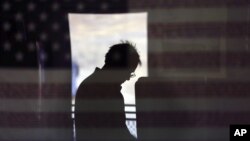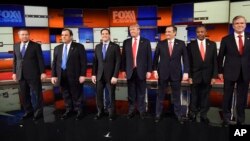As the U.S. presidential election cycle goes into high gear, and polls become a constant staple of media coverage, experts say it has become harder to gauge who will win the race. They point to past pre-election surveys that did not accurately predict the outcome.
They note that Mitt Romney beat Barack Obama in several polls just before the November 2012 election. Once the votes were counted, Obama emerged the winner by a substantial margin. Several surveys also missed the strength of the Republican wave that swept the House of Representatives in 2014.
“There are probably going to be more errors,” said Rutgers University political science professor Cliff Zukin.
Online transition
Telephone surveys have been the mainstay of public opinion research for decades, but now that many people use cellphones and can see who’s calling, response rates have plummeted. Pew saw a decline from 36 percent in 1997 to 9 percent in 2012.
That may raise the risk that pollsters are not hearing from important sets of voters. It also makes polling more expensive, because researchers have to place more calls to get an accurate picture of what the public thinks.
So pollsters increasingly are turning to online surveys, "which is a new frontier for us," Zukin said.
Major media outlets including NBC News and The New York Times are using online polls.
These polls are not to be confused with the haphazard surveys found on many websites, including post-debate polls on news websites. As Slate magazine puts it, these polls are "completely unscientific and unserious."
Not random
The key to an accurate election poll is having respondents who look like the people who will vote. Telephone polls aim to get there by contacting people at random from a target area.
Internet polls can’t do that. “There’s not a complete list of email addresses for everyone online,” said Mark Blumenthal, head of election polling for SurveyMonkey, one of the largest online polling companies. “We couldn’t randomly email people even if we had it,” he added. Spam filters make that option impractical.
Online polls take a different approach. They start with data about the age, race, education level and other demographics of people in a given area from sources like the U.S. Census Bureau. Then they use this information to sort through groups of respondents.
Some polling companies create representative samples by recruiting panels of thousands of people to take their surveys. SurveyMonkey selects from the millions who are already using its services to create its own surveys.
“They’re not a random sample, per se, but they’re very close,” Blumenthal said.
Still evolving
While online polling may be the way of the future, it’s a future that many experts say is still a long way off.
“Frankly, no one has the silver bullet,” said Courtney Kennedy, director of survey research at the Pew Research Center. “No one can say this type of Internet polling is good, this type is bad. It’s very much an active area of research.”
It’s an awkward time for experimentation, Zukin noted. “The 2016 election arrived before the pollsters’ ability to figure out how to do a good Internet poll,” he said.
Democratic pollster David Mermin of Lake Research Partners said his firm still mostly conducts telephone polls. “It’s more difficult than it used to be, but it’s not impossible,” he said. And the polls are “still pretty accurate, certainly on U.S. elections, a couple of visible failures notwithstanding.”
Not everyone agrees the process has become more difficult.
“Certainly we’re in a challenging period,” said Mollyann Brodie, president of the American Association of Public Opinion Research.
“When you think about the history of polling, we’ve always been in a challenging period of polling. And polling has managed to adapt to the ways people communicate,” said Brodie, who also heads survey research at the Kaiser Family Foundation.
Brodie and others say a big reason for recent poll failures is that it is difficult to predict who will actually show up on Election Day.
While those failures are concerning, she said, polling isn't dead.
“Quite frankly, there isn’t a better way in a democracy to find out what people think and what they want,” she said.






